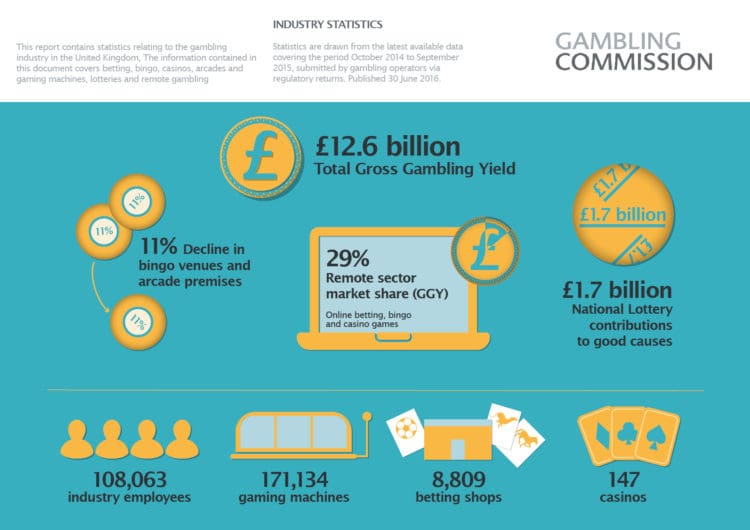In the past, you used to pay a tax to the government either as a tax on your stake or as a tax on your winnings. What changed then? In 2002, the UK government was concerned the British gambling industry wasn’t going to be able to compete with the rise of online gambling sites in UK. In general, no UK gamblers/traders will pay tax on their winnings. They are Tax Free. The Inland Revenue has now shifted to onus of any tax liable, to be paid by the companies, bookmakers, and trading outlets – such as Betfair, and this takes a whole heap of pressure of the punters/gamblers. Players are not required to pay taxes on winnings from online or land based casinos in the United Kingdom. UK gambling tax applies to casino operators, who are required to pay 2.5-40% of their gross gaming revenue. The United Kingdom has a wide variety of casinos, with around 24 in London, 13 in Scotland and 5 in Wales. History Of Gambling Tax In The UK It wasn’t always so rosy for UK punters though. From 1960 through 2001, when Gordon Brown abolished gambling tax in that year’s budget, bettors could choose to pay 9% tax on either the stake (keeping it minimal) or their winnings (potentially all or nothing).
- Gambling Tax Uk Winnings Tax
- Gambling Tax Uk Winnings Tax Calculator
- Gambling Tax Uk Winnings 2019
- Gambling Tax Uk Winnings Money


Those who gamble, especially those who are very new to it or, conversely, those that do it an awful lot, often wonder if there are any tax implications involved with gambling. The short, simple and wonderfully sweet answer is that no, there is no tax at all to pay on either gambling winnings or stakes in the UK (if you are not based in the UK please check your local jurisdiction).
This was not always the case, you might be unsurprised to hear, as the government is never one to miss a chance to squeeze an extra few quid out of us when they can. Betting shops were legalised as part of the liberal mood that swept the country during the 1960s but a tax was levied, either on the stake or winnings (as decided by the punter prior to bet placement). This was charged at 9% but was abolished by Gordon Brown in the March budget of 2001, with the changes coming into effect on January 1st 2002.
Taxing Offshore Betting Sites
The then Chancellor was concerned that the country was losing revenue – not to mention jobs – to offshore gambling sites which people could access via their phones or the internet. Many of the big UK brands had moved offshore where they could take bets without the punters being taxed and Brown’s move was designed to stop that. The tax on the gambler was replaced with a 15% levy on the gross profits of bookmakers and since that momentous day over 10 years ago there has been no tax at all for punters to pay no matter how much they win from gambling.
This has had many ramifications and one is the growth of financial betting as an alternative to conventional investment mechanisms, the former offering tax free winnings, the latter subject to standard tax laws. It has also made UK-based bookies and betting shops far more competitive and has been instrumental in the growth and success of the UK gambling industry.
Follow up legislation further strengthened the domestic market by levying the same 15% tax that UK-based companies face against those based offshore. Remote gambling operators with UK customers currently benefitting from their bases in offshore havens such as Gibraltar and the Isle of Man now have to pay 15% tax on their operating profits. It was estimated to raise around £300m annually for the government and came into force in December 2014.
FOBT’s Stakes Down, Online Taxes Increase to 21%
In 2019, and after a long drawn out battle in both the media and houses of commons, the maximum stake permitted on Fixed Odds Betting Terminals found in high street bookmakers was reduced to £2 – a huge cut when you consider the fact that the previous limit had been £100.
Whilst the cut in stake was primarily intended to help protect vunerable and problem gamblers it also had the knock on effect of reducing the tax revenue generated by the machines. To compensate for this the UK Government chose to increase the 15% tax rate to a whopping 21%.
Despite the increase, crucially, this has no real impact on us as punters. To go back to the very simple answer as the beginning of this piece – gambling profits and stakes in the UK are still totally tax free.
The high rollers among you will of course already be aware that your gambling winnings aren’t taxable in the UK. To be fair, even the smaller stakes players know this.
Here, we have a system in that we do not have to pay taxes on any of your winnings or stakes. And while this wasn’t always the case, today, this applies to all types of gambling, betting, poker, bingo slots and lotteries.
In many ways you are still paying tax on gambling it is just this is now put directly onto betting companies in the form of a point of cosumption tax. This 21% tax online and 15% in retail shops ultimately gets passed onto the customer through lower value odds and payouts. Once you do win money though it has effectively been pre-taxed and so you do not need to worry about paying any further tax at that stage.
If you do land that big one, or you simply make a lot of money through gambling in your life, you can rest assured knowing that HRMC are not entitled to a slice and can only watch on. That is until you want to give that money away or leave it to someone who will inherit it. Here we will look at that aspect of tax on gambling winnings.
History Of Gambling Tax In The UK
It wasn’t always so rosy for UK punters though. From 1960 through 2001, when Gordon Brown abolished gambling tax in that year’s budget, bettors could choose to pay 9% tax on either the stake (keeping it minimal) or their winnings (potentially all or nothing).
This changed just after the century however and a 15% tax on bookmakers and their gross profits was imposed on the point of supply instead. It was around this time that many UK bookmakers, led by BetVictor, moved their online operations offshore to Gibraltar where tax was capped at 1%.
In 2014, there was another alteration the 2005 Gambling Act when tax was changed to 15% on all gross profits at point of consumption including those firms holed up in Gibraltar and the Isle of Man. In 2019 the tax rate was increased to 21% for online betting.

Does this situation mean that people who use gambling as their main source of income earn a tax free living? Well, yes, even in the case of professional gamblers, winnings are not taxable.
Gambling winnings, therefore, remain tax-free, regardless of whether it’s your main source of income or just a bit of fun. The only counter to the rule being if a player is appearing somewhere for a fee, thus professionalising his or her appearance.
Spread betting also falls outside of these rules, it is actually classed as trading, meaning if you do it as your main source of income then you are liable to pay income tax on this for of gambling.
What About Inheriting Gambling Winnings?
While your winnings aren’t taxable by any gambling laws, other taxes may still apply, not least of all your winnings could be vulnerable to an inheritance tax when you die.
Gambling Tax Uk Winnings Tax

Inheritance tax is levied on property or cash that somebody acquires by means of a gift or, well, inheritance.
If someone inherits your winnings they will be liable to inheritance tax so long as your estate is large enough. You might choose to get around this tax by giving your money away.
You can give away a tax free £3,000 annually to a person or even dish out up to £250 away in a gift to anyone you like so long as it is no more than £250.
Even if you do give your money away to a charity, it can still be taxed should you die within 7 years of your donation. Should you live longer than those 7 years, all monies will be exempt from the inheritance tax.
Gambling Tax Uk Winnings Tax Calculator
The threshold for this tax is £325,000.
Does This Only Apply To Big Amounts?
Gambling Tax Uk Winnings 2019
Not necessarily. You may have say £20,000 in gambling winnings saved as cash or assets, which of course would not be enough to be liable for inheritance tax on its own. If, however, the rest of your estate was worth over £325k then this money, no matter its source, will be added onto the top of that amount and if that takes you over the threshold there will be tax to pay.
Even if you use gambling winnings to buy a house and give this away in your inheritance it does not matter, the value of the house (or assest) will still be calculated as part of your estate.
Gambling Tax Uk Winnings Money
The choice if you are in the situation is either to give your money away in small amounts over a number of years or face the fact it could be liable for inheritiance tax.
